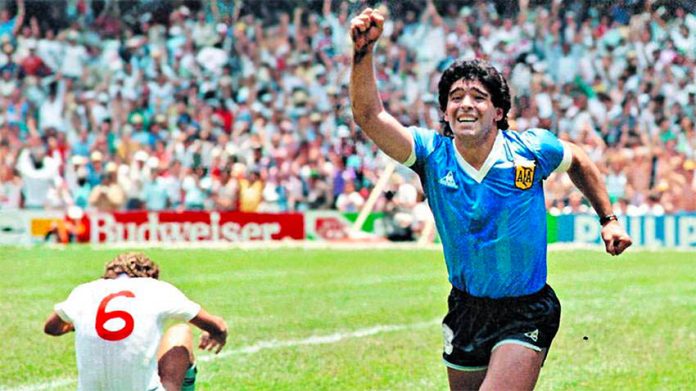In among the widespread international responses to the death of former soccer star Diego Maradona, from sporting icons to global politicians to celebrities, it perhaps escaped popular notice to what extent — especially with the pre-eminent focus being on Argentina and Naples — the reaction in Mexico was markedly different from elsewhere.
Globally, what is most remembered is a sporting icon seen on television sets and heard magically reported on radio, whereas in Mexico, a generation and a half ago, 100,000 people remember watching Maradona lift the World Cup, live, in the Azteca Stadium, with another few hundred thousand people able to witness him live across the other matches of the ‘86 World Cup.
Although international travel was possible in the 80s, it was nowhere near as affordable and prevalent as it is today (pre-pandemic, of course), so stadium audiences of the time tended to be composed much more of locals than is the case today. Thus, the popular memory of the live witnessing of that World Cup, in which one man — rather than a country — took the trophy home is directly remembered more by Mexicans and Mexico than by any other country in the world.
Initially slated to be held in Colombia, the original hosts of the 1986 tournament bowed out in 1982 due to a local financial crisis and spiralling endemic violence blighting the country’s political and economic system. It was deemed to be too big a risk to host such a major sporting event there.
As a result, and in what many suspected to be the result of underhanded dealings between FIFA’s Joao Havelange and the president of Mexican broadcaster Televisa, the Mexican football federation swooped in to fill the Colombian boots. The decision strained relations between the new hosts and Mexico’s U.S. neighbor, whose bid was never discussed, and who thought that Mexico’s heat, altitude, and unemployment difficulties made it an odd choice to host the most prestigious football competition in the world. Overt contempt was displayed from the northern neighbor to its southern partner — how little the world changes.
The tournament was jeopardized a second time just eight months before the tournament when a catastrophic earthquake hit Mexico City, killing an estimated 20,000 people and displacing a further 150,000. A United Nations report at the time estimated that the quake caused US $4 billion worth of damage in just three minutes, but despite the collapse of 412 buildings in Mexico City, none of the football stadiums was damaged.
And so the tournament kicked off on Sunday, June 1 with a 1-0 Brazilian victory over Spain and soon moved the fervor into the fervent following for the Mexican national side which, while winning their group and dispatching Bulgaria into the round of 16, could never quite shake the feeling that they weren’t the main draw in town.
That draw, of course, was Maradona.
“I remember it so vividly,” says Enrique Gutiérrez. “Maybe because I was young, and there was so much hardship around, and we had just lived through the earthquake, who knows? Our neighborhood was a mess, every third or fourth house had collapsed, but that summer I remember as though it was yesterday. I see it in technicolor. I proposed to my sweetheart that summer. That summer it felt like we were really living, whatever else was happening. And Maradona was the man at the heart of making the impossible seem attainable.”
Francisco Rodríguez, for his part, recounts how he would take his shoe cleaning stool to the Metro station outside the Azteca, and how much demand there was for his work: “It seemed as though every man would not go in without shiny shoes. Everyone knew even then that it was an event they were attending. When I think of The Hand of God, I don’t think of the goal against England, I consider it that God was on Maradona’s side throughout the tournament. It all felt pre-ordained.”
Tributes came from all corners, even President López Obrador: “In Mexico, Maradona lived his star moment as a footballer. It was through him that I discovered grace in the sport of football. But my greatest admiration for him was in his coherence. He never renounced his ideals, even when he paid the price for being regarded as ‘politically incorrect.’”
And there lies the nub, in the life and death of El Pibe de Oro, because just as he generated magic on the field of play, leaving generational memories for those who witnessed him, the man was always palpably, demonstrably one of them. He was always the boy from the barrio, the young man punching up, the idealist fighting injustice.
We all knew who he was, always. Out there on the pitch, the paths he lit were more than the work of a superhuman, they represented the paths to glory we might all have taken, once, if only we had not chosen different paths.
Maradona dreamed our dreams for us, and made them real.
Shannon Collins writes from Campeche.
